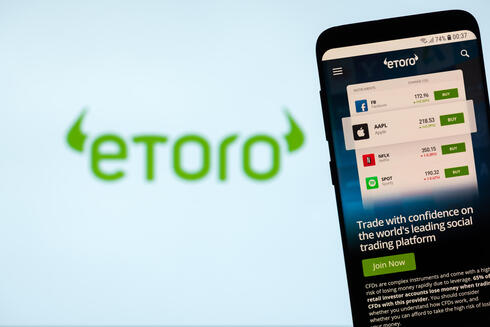
eToro tops $5.5 billion valuation as shares surge on Nasdaq debut
The Israeli fintech company rides crypto wave and market optimism to a strong public listing after two false starts.
After two failed attempts, eToro has successfully completed its long-awaited IPO on Nasdaq, achieving a valuation of $4.3 billion and enjoying a strong debut "pop", a sharp first-day surge that brought its market cap to over $5.5 billion at one stage. The Israeli-founded trading platform ended the day up almost 29%.
The company, best known for its social trading model and crypto exposure, had previously canceled a 2022 offering after the tech market crash and postponed another planned IPO in April 2025 amid trade war shocks triggered by President Trump.
This time, however, eToro picked the perfect moment. Wall Street has rebounded, erasing year-to-date losses just as the IPO closed on Tuesday. Optimism is now swirling around anticipated capital inflows from Saudi Arabia and Qatar following Trump’s recent visit to the Middle East.
eToro's IPO is being closely watched as a bellwether for the broader tech and fintech sectors. Many entrepreneurs and investors have been waiting for signs of renewed demand in public markets. While industry insiders had expected IPO windows to reopen by late 2024, the actual reset came only in the first half of 2025, and eToro boldly went first.
The company's IPO process suggests Wall Street's appetite for tech stocks is returning. eToro originally planned to sell 10 million shares at $46–$50 each, but soaring demand from institutional investors allowed underwriters to raise the final price to $52 and increase the offering size. In total, 11.9 million shares were sold - half newly issued, raising $300 million for the company, and half existing shares sold by early investors and insiders.
Including the exercise of the greenshoe option, the total offering raised $712 million. The IPO was led by Goldman Sachs and Jefferies, with underwriting support from UBS, Deutsche Bank, Citi, and Bank of America, signaling widespread Wall Street buy-in.
Other Israeli unicorns are preparing to follow in eToro’s footsteps. Navan (formerly TripActions) is eyeing a $12 billion valuation. Cato Networks, led by cybersecurity veteran Shlomo Kramer, is reportedly targeting at least $5 billion. Snyk Security, another cybersecurity startup, is pursuing a $10 billion IPO. Veteran companies like AppsFlyer and Via are also exploring listings.
eToro’s IPO has also delivered a windfall for its founders and investors. Shares were sold by a diverse group including the BRM fund (co-founded by Economy Minister Nir Barkat), attorney Hanina Brandes, Avner Stepak of Meitav Dash, Hedva Ber (former Bank of Israel supervisor and eToro deputy CEO), and other institutional and private backers.
Roughly one million shares were sold by current and former eToro employees, translating to $52 million (pre-tax) flowing to Israel. eToro's employee base is still heavily concentrated in Bnei Brak, an unusual setup for a global fintech firm. But since the platform requires no in-person sales, it has been able to scale internationally while retaining its Israeli core.
Founded in 2007 by brothers Yoni and Ronen Assia, eToro set out to democratize trading through a social network approach that allows users to mirror the portfolios of top investors. As cryptocurrencies gained popularity, the platform shifted focus, making crypto a dominant part of its revenue model. That same focus derailed its 2021 SPAC deal, which fell apart after regulatory scrutiny from the U.S. Securities and Exchange Commission (SEC).
By the end of 2024, eToro reached a settlement with the SEC and scaled back most of its crypto offerings. This regulatory cleanup, along with a surge in Bitcoin prices following Trump’s election win, paved the way for a successful IPO.
The company’s prospectus shows that while revenue from traditional securities (stocks, currencies, commodities) remains relatively flat, crypto trading has exploded. In 2024, traditional trading generated $328 million in revenue, up from $305 million in 2023 but down from $393 million in 2022. Meanwhile, crypto trading volume soared to $12 billion in 2024, up from $4 billion in 2023 and $6 billion in 2022.
eToro posted a net profit of $192 million in 2024, up dramatically from $15 million in 2023 and a $215 million loss in 2022. Trading commissions grew to $931 million in 2024—a 46% increase year over year.
Looking ahead, eToro expects to report 3.58 million active funded accounts by the end of Q1 2025, up 14% from a year earlier. First-quarter commissions are projected at $214–$217 million, a 7% increase. However, net profit is expected to dip slightly to $60 million, down from $64 million in Q1 2024, due to aggressive investments in growth.
Crypto’s share of total trading is expected to decline slightly to 37%, with stock trading making up 43% of volume. The company attributes its ongoing momentum to effective marketing and its acquisition of Australian trading platform Spaceship.















